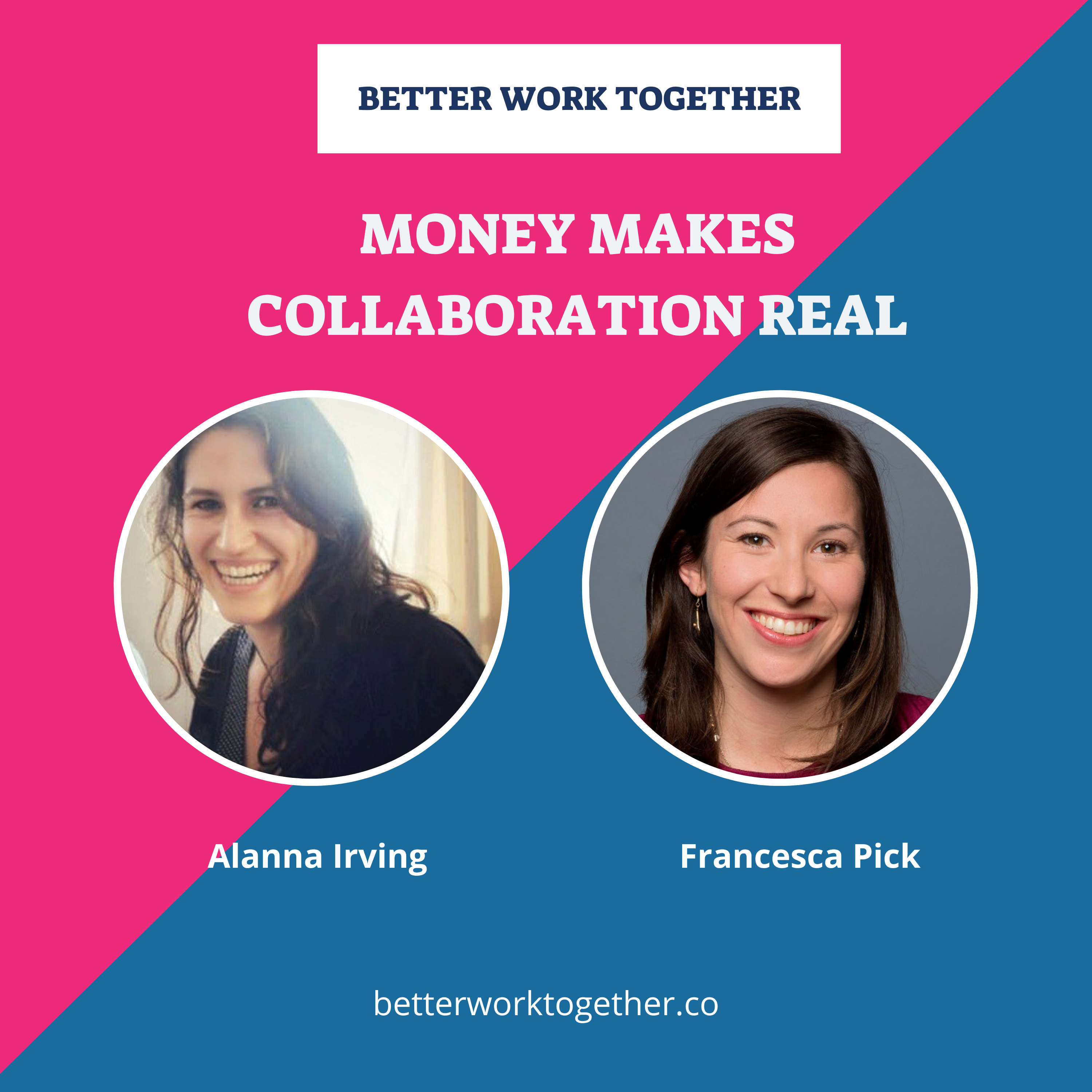Money makes collaboration real.
Insights from pioneers of methods of collaborative funding and groups that spend money together.
How does it practically work when groups of people want to be more collaborative and democratic with how they spend money? What gets in the way of collaboration with money? What happens in groups that do it well?

I recently sat down with Francesca Pick and Alanna Irving, both established pioneers in methods of collaborating with money, to put a spotlight on how we think about and use money in groups.
The conversation covers a wide range of topics; different collaborative funding methods, why collaboration with money gets hard, what the practical solutions are to overcome these challenges and what’s emerging at the edges of experimentation in this space today (yes, crypto, kind of..).
A few of my key learnings:
1) Collaborating with money is a forcing function to create a more resilient, responsive organization.
When any group starts collaborating with (or even talking about) spending money it surfaces reflections on how we recognise value, what we pay for, what we don’t, how we manage risk and expect return.
Working with money brings up key strategic organizational challenges in governance, accountability, direction setting and decision making.
It brings up highly practical challenges around tools, management, financial compliance, tax codes and administration.
It surfaces tension. Some people get uncomfortable and conversations can get shut down or avoided. Power hierarchies are exposed.
As organization builders, how we decide to work together with money creates deeply embedded patterns of behavior that determine how a group functions. It becomes a leading indicator of how an organization expresses its deeper values. Much of this we already take for granted - and only becomes evident when we try something new.
So what’s the upside?
By deciding to adopt more collaborative processes with money, we create an opportunity to surface and resolve our own blockers and hangups, align an organization at a values level in a practical, tangible way. We develop important interpersonal skills, financial literacy and build highly resilient, responsive organizations that can quickly make decisions to allocate resources strategically. In other words, the things that make it hard become great opportunities to level up as individuals and as an organization.
2) The tools and infrastructure being built and adopted have the potential to enable significant change in how we organize society.
The operational issues of holding money, distributing control of it, transparent reporting, management and legal compliance creates major headaches. This is especially true for unincorporated entities, grassroots community initiatives and informal, networked groups that want to be more democratic with pools of shared money.
Working out how to practically enable a group of people to be able to understand the financial position of a group, control a pool of money together and democratically, transparently decide how much will get spent on what is a difficult thing to do.
These barriers often stop people from either trying or being successful and therefore many default back to easier, less ambitious, less collaborative, less democratic methods.
Software tools like Open Collective and Co-budget can change this. The development of these types of infrastructure make it (much) easier for groups to be able to use and share money. This creates conditions for mutual aid, democratic community organizing and bottom up, innovation friendly organizations. These are all things that the world sorely needs to avoid defaulting to becoming more transactional, fragmented and autocratic.
3) We’re (still) just getting started.
It has been 10 years since people from Enspiral started building co-budget as a tool to distribute its surplus back out to its members to decide what to build next. Operational infrastructure like Open Collective didn’t exist 6 years ago. The crypto wave, although loud and ambitious, is still really just getting started delivering any kind of meaningful systems level leapfrog. Although technology can be built relatively quickly, it doesn’t provide the whole solution.
If the promise of a more collaborative, democratic society full of organizations that enable more participation in financial decision making is to be realized, then we need to go well beyond software tools.
The harder part is growing the skills and developing the culture. This happens through ongoing experimentation, commitment to continually trying new things, learning, sharing what works and supporting more people to keep adapting similar experiments.
How we relate to money, how we share it and expect to make decisions around it affects everything from our family bank accounts to our national tax systems. It is part of our sense of identity. It is a forcing function that has the potential to change society in meaningful ways.
As technology keeps developing and as more collective experiments gain traction in both informal community and formal organizations, I think our ‘normal’ expectations and relationship to money will evolve in the coming years.
For me the most interesting path forward lies in continued experiments that challenge basic assumptions and test what is possible.
You can listen to the full episode here.
Learn more about these ways of working in Better Work Together book here.
